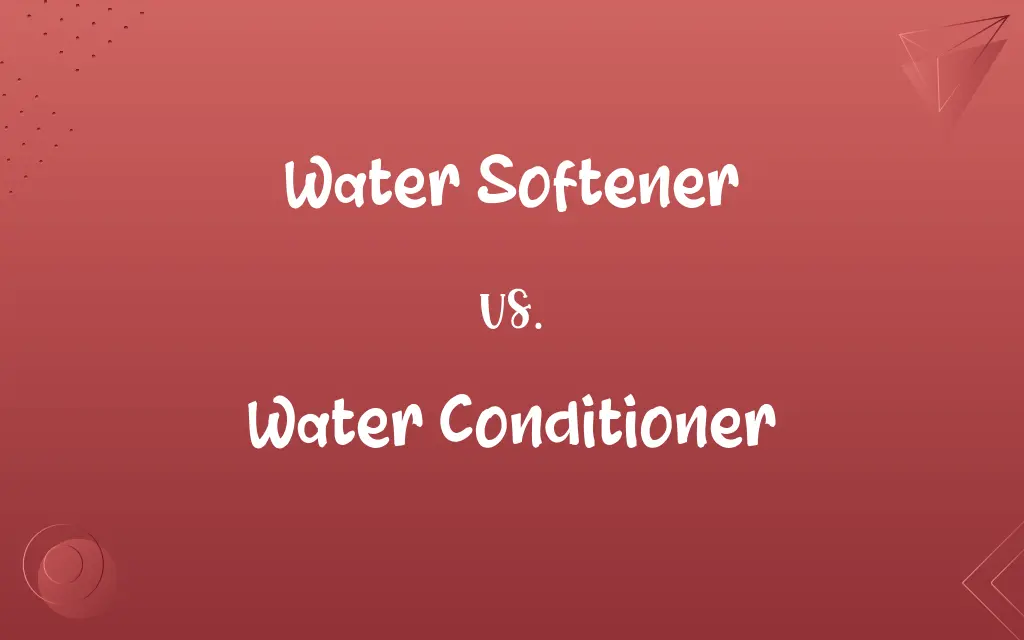Water Softener vs. Water Conditioner: Know the Difference

By Shumaila Saeed & Hifza Nasir || Published on December 3, 2024
Water Softeners remove hardness minerals via ion exchange, while Water Conditioners address water quality without altering mineral content.

Key Differences
Water Softeners are designed to eliminate calcium and magnesium ions, the primary causes of water hardness, through a process called ion exchange. This system typically uses salt to replace hardness minerals with sodium ions, resulting in "soft" water. Water Conditioners, however, work by altering the physical properties of hardness minerals, preventing them from depositing as scale without removing them. These systems may use various technologies, including magnetic, catalytic, or electronic means, to condition the water.
Hifza Nasir
Dec 03, 2024
The primary goal of a Water Softener is to prevent scale buildup in pipes and appliances, which can improve efficiency and longevity. Softened water is especially beneficial in reducing soap scum and enhancing the performance of soaps and detergents. Water Conditioners, while not removing minerals, aim to mitigate the negative effects of hard water, such as scale and spotting, without the use of salt or chemicals. This makes conditioners a popular choice for those seeking a more environmentally friendly option.
Shumaila Saeed
Dec 03, 2024
One of the notable differences between the two systems is their maintenance requirements. Water Softeners require regular replenishing of salt and occasional cleaning of the resin bed. In contrast, Water Conditioners often boast lower maintenance, as many do not require salt or frequent servicing. This aspect can be a significant consideration for homeowners when choosing between the two.
Shumaila Saeed
Dec 03, 2024
Water Softeners add a small amount of sodium to the water, which can be a concern for individuals on low-sodium diets. Water Conditioners, maintaining the mineral content of the water, do not introduce sodium, preserving the natural taste and potential health benefits of minerals in the water.
Hifza Nasir
Dec 03, 2024
The choice between a Water Softener and a Water Conditioner may also be influenced by local regulations. Some areas, concerned with the environmental impact of salt discharge from softeners, restrict their use, making conditioners a more viable option.
Hifza Nasir
Dec 03, 2024
ADVERTISEMENT
Comparison Chart
Primary Function
Removes hardness minerals
Conditions water to prevent scale
Shumaila Saeed
Dec 03, 2024
Maintenance
Requires salt replenishment and cleaning
Generally lower maintenance
Shumaila Saeed
Dec 03, 2024
Environmental Impact
Salt discharge into wastewater
No salt or chemical discharge
Dua Fatima
Dec 03, 2024
ADVERTISEMENT
Scale Prevention
Eliminates scale buildup
Prevents scale without removing minerals
Dua Fatima
Dec 03, 2024
Regulatory Considerations
Subject to local restrictions
Fewer regulatory concerns
Hifza Nasir
Dec 03, 2024
Cost Implications
Ongoing cost for salt and maintenance
Typically lower operational costs
Dua Fatima
Dec 03, 2024
ADVERTISEMENT
Water Softener and Water Conditioner Definitions
Water Softener
Requires regular salt replenishment.
They added salt to their water softener to maintain its efficiency.
Hifza Nasir
Feb 26, 2024
Water Conditioner
Maintains water's mineral content.
The water conditioner left essential minerals in the water.
Shumaila Saeed
Feb 26, 2024
Water Softener
Can increase soap efficiency.
Soap lathered better with the softened water from their system.
Shumaila Saeed
Feb 26, 2024
Water Conditioner
Uses various technologies without salt.
The magnetic water conditioner operated without needing any salt.
Hifza Nasir
Feb 26, 2024
Water Softener
May add sodium to water.
The water softener slightly increased the water's sodium content.
Dua Fatima
Feb 26, 2024
Water Conditioner
Environmentally friendly option.
They chose a water conditioner to avoid salt discharge into the environment.
Hifza Nasir
Feb 26, 2024
Water Softener
A system that removes hardness minerals from water.
After installing a water softener, their shower doors were free of scale.
Hifza Nasir
Feb 26, 2024
Water Conditioner
A device that conditions water to prevent scale.
Their water conditioner effectively prevented pipe scaling.
Shumaila Saeed
Feb 26, 2024
Water Softener
Uses ion exchange technology.
The water softener's ion exchange process replaced calcium with sodium.
Shumaila Saeed
Feb 26, 2024
Water Conditioner
Generally requires less maintenance.
Their water conditioner needed minimal upkeep compared to softeners.
Hifza Nasir
Feb 26, 2024
Repeatedly Asked Queries
Can I install a water conditioner if I have a septic system?
Yes, water conditioners are generally safe for septic systems as they do not add salt or chemicals to the water.
Shumaila Saeed
Dec 03, 2024
Is softened water harmful to plants or lawns?
The sodium added by water softeners can be harmful to plants in large amounts; using conditioned or untreated water is better for irrigation.
Hifza Nasir
Dec 03, 2024
Do water conditioners change the pH of water?
Most water conditioners do not significantly alter the pH level of water.
Dua Fatima
Dec 03, 2024
Will a water softener remove iron from my water?
Water softeners can remove small amounts of soluble iron, but high levels may require a specialized iron filtration system.
Shumaila Saeed
Dec 03, 2024
Does the water from a softener feel slippery?
Yes, softened water can feel slippery due to the absence of minerals and the enhanced effectiveness of soap.
Hifza Nasir
Dec 03, 2024
Are there alternatives to salt-based water softeners?
Yes, salt-free softeners and water conditioners are alternatives that condition water without salt.
Shumaila Saeed
Dec 03, 2024
Do water softeners make water safe to drink?
Water softeners focus on hardness minerals and may not remove contaminants, so water safety depends on the overall water quality.
Hifza Nasir
Dec 03, 2024
Can I use a water softener in an apartment?
Portable or magnetic water softeners can be an option for apartments, but installation may be limited by space and plumbing.
Shumaila Saeed
Dec 03, 2024
Can water conditioners remove chlorine or other chemicals?
Most water conditioners target scale prevention and may not effectively remove chlorine or other chemicals without additional filtration.
Shumaila Saeed
Dec 03, 2024
Are water conditioners effective in all types of hard water?
The effectiveness of water conditioners can vary with the water's mineral composition and the specific technology used.
Shumaila Saeed
Dec 03, 2024
Can water conditioners help with existing scale buildup?
Some water conditioners can help reduce existing scale over time, but results vary.
Hifza Nasir
Dec 03, 2024
Can I use both a softener and conditioner together?
Yes, combining both can offer comprehensive water treatment by softening and conditioning the water.
Shumaila Saeed
Dec 03, 2024
How often do I need to replace the salt in a water softener?
The frequency depends on water hardness and usage, but it's typically every few weeks to months.
Shumaila Saeed
Dec 03, 2024
Will a water conditioner prevent all types of scale?
While effective against common scale, some conditioners may not prevent all types, depending on the water's chemistry.
Dua Fatima
Dec 03, 2024
How long do water softeners and conditioners last?
With proper maintenance, both systems can last many years, typically 10-20 years depending on the model and usage.
Hifza Nasir
Dec 03, 2024
Share this page
Link for your blog / website
HTML
Link to share via messenger
About Author
Written by
Shumaila SaeedShumaila Saeed, an expert content creator with 6 years of experience, specializes in distilling complex topics into easily digestible comparisons, shining a light on the nuances that both inform and educate readers with clarity and accuracy.
Co-written by
Hifza Nasir







































































